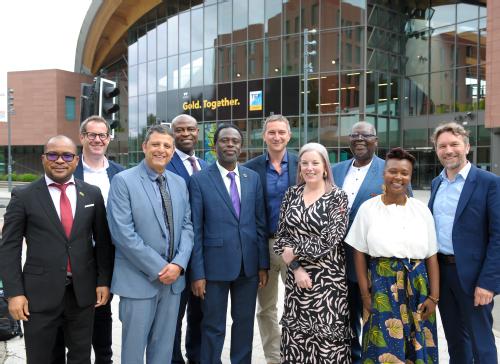Press Releases
United Nations University Rector Professor Tshilidzi Marwala delivers annual lecture at The University of Warwick to tackle the challenges and opportunities of AI in Higher Education
The University of Warwick welcomed Professor Tshilidzi Marwala, Rector of the United Nations University, who delivered an insightful address to staff, students and members of the public this week. Professor Marwala, an authority on artificial intelligence (AI) and its educational applications, gave the Distinguished Africa Lecture on his vision of the transformative potential of AI in higher education and its implications for Africa.
The annual Distinguished Africa Lecture is a cornerstone of the University of Warwick’s Africa Hub programme of engagement which is designed to showcase world-leading African scholarship.
Professor Franklyn Lisk, Co-Academic Director for Africa at the University of Warwick, said “The Warwick Africa Hub focuses on advancing new research ideas unconstrained by disciplinary boundaries and building collaborations that extend beyond universities. We would like to extend our sincere thanks to Professor Marwala for such an insightful presentation and sparking critical debate in this field.”
In his Lecture, Professor Marwala emphasised that the global shift towards AI is revolutionising teaching and learning through personalised education, optimised resource allocation, and interactive curricula.
However, he said: “Africa faces significant challenges such as insufficient technological infrastructure and systemic issues within its education system. Despite these obstacles, he highlighted the potential for AI to enable Africa to bypass traditional development stages through strategic technology integration, fostering public-private collaborations, and addressing the digital divide”.
He discussed the hurdles universities face with AI, including funding constraints, lack of qualified personnel, and disparities in student access to digital resources. Nonetheless, AI offers opportunities for personalised learning, enhanced administrative efficiency, and innovative teaching methods. By overcoming these challenges, universities can leverage AI to improve education outcomes.
To build the necessary infrastructure and attract investment for AI in Africa, Professor Marwala called for tailored solutions developed by African innovators and policymakers. He stressed the importance of data governance, capacity building, and the development of local data sets, supported by comprehensive AI policies and a supportive environment for startups.
Professor Marwala advocated for transforming university curricula to integrate AI and other emerging technologies. This involves adopting a multidisciplinary approach, fostering industry partnerships, and providing hands-on learning experiences to prepare students for future job markets.
To ensure all students, including those in remote areas, benefit from AI and advanced technology, Professor Marwala emphasised the need for robust technological infrastructure, affordable access to devices, and tailored AI tools that consider diverse linguistic and cultural contexts. Flexible learning models, including remote and blended learning options, can further enhance accessibility.
He highlighted the crucial role of international partnerships in advancing AI education in Africa. Such collaborations provide access to technology, research, and expertise, facilitating knowledge transfer and innovation.
Looking ahead, Professor Marwala envisions a future where African universities harness AI to offer personalised education and bridge gaps in access and quality. This shift will empower students with essential skills, fuel innovation and entrepreneurship, and contribute to a knowledge-driven economy, fostering sustainable development.
